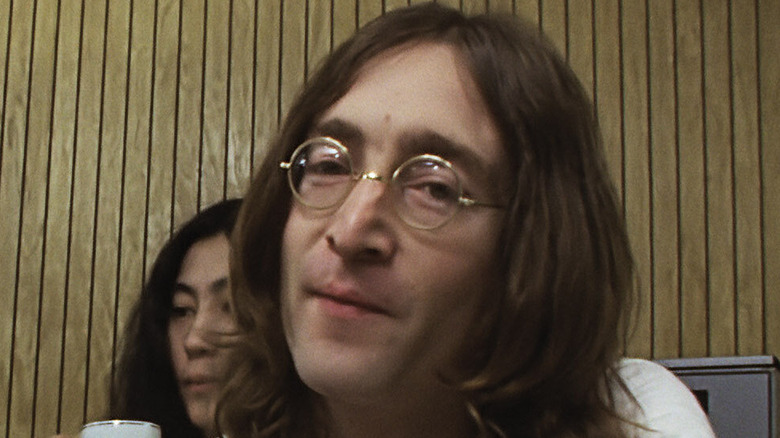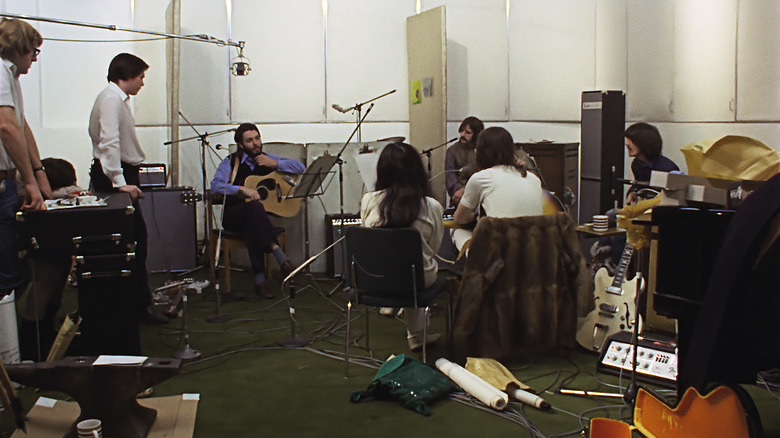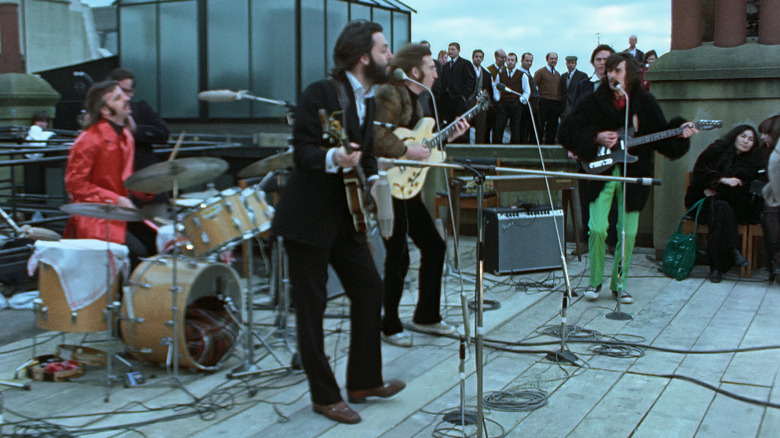The Beatles: Get Back Review: Reality Leaves A Lot To The Imagination
Not so much a film as an immersion, Peter Jackson's "Get Back" is unlike anything you've seen before. Utilizing an aesthetic that feels minimally invasive, belying breakthrough restoration and modern editing techniques, the movie takes you on a seven-hour trip in a time machine, depositing you into the presence of genius. By the time it's over you'll feel like it's your own lived experience, like you know the Fab Four as if they're your acquaintances, and you'll be humming its songs for weeks, because you will have watched them grow from the tiniest seed of inspiration to full maturity.
Whether you watch it in parts or its full, 468-minutes-long runtime, the Disney+ documentary can appear intimidating at first. But Jackson hits the ground running with an excellent montage that walks the viewer through the first several phases of the Beatles, giving younger viewers a breezy lesson on the most beloved rock band of all time while getting more experienced fans on the same page: It's January 1969, the Beatles haven't toured in some time, they are growing increasingly weary and weighed down with the baggage of stardom, but they have come together to create 14 songs and then play them live for a TV special in front of an audience.
The press materials for "Get Back" come with a disclaimer asking critics not to spoil "any surprises and plot twists," which at first feels ridiculous. Isn't this a documentary about one of the most documented musical acts of all time? Is Disney concerned word might leak that they break up? Will Nick Fury show up in the end credits and ask Ringo to join the Avengers Initiative?
But sure enough, Jackson extracts incredible tension from of his source material, 60 hours of film footage and 150 hours of audio that he gained access to after the rights holders saw his "They Shall Not Grow Old" documentary. Similarly breathing new vitality into old footage, Jackson blows away the 1970 80-minute documentary "Let It Be" originally birthed, instead operating with almost a reverse-editing technique that makes the viewer understand true breakthroughs do not arrive with "Eureka!" moments and reality show-like drama, but a quiet nod between collaborators who've finally found a lyric the world will be singing for the next 50 years.
The best way to watch "Get Back," honestly, is to just turn it on at home and pretend you're just one of the dozen or so people in orbit around the Beatles — producers and sound people, roadies and spouses and others who wander in and out of frame. It's like watching those uncut live feeds of the "Big Brother" house, but if the house were filled with talented people.
At the center of most shots is the Fab Four, sitting down and facing each other and swatting away the boom mic and smoking so many cigarettes the cast of "Mad Men" would encourage them to slow down. Paul is eager to show off his new material (and instructions for the others on how to play it); Ringo rarely leaves the drum stand, providing an eager beat for even the most nonsensical noodling; George has weary eyes that seem like he has some things on his mind; John is the only Beatle in most shots with someone at his side, as Yoko Ono silently flanks him, knitting and clipping magazines even when tape is rolling.
We can work it out
If you're a Beatles diehard, watching hour after hour of this footage will give you the best indication yet of how these legends lived, talked, and created. Lennon refers to Harrison's music as "Harrisongs"; Ringo earns nicknames like "Russia"; Paul unveils soon-to-be-classics with little more than a melody and placeholder lyrics like "second verse, I haven't got it yet."
Then there's the band's great white whale, "Get Back." By the time you've sat through the entire documentary, you'll have heard the song three dozen times (not that it makes it any less catchy); McCartney has the framework from the beginning, but struggles to find lyrics that fit, or a "hook" to drive it home. Much experimentation is done with protest lyrics referencing anti-immigrant headlines of the day, side-stepped cliche phrasing like "blast from the past" and attempting to give Jo Jo a last name. Then John and Paul finally stumble upon "Tucson, Arizona," as Paul is a fan of the TV western "The High Chaparral," which films there; John has never heard of the city. When the Beatles welcome Billy Preston into the studio he visibly invigorates their creativity, and when George uses "Reach Out (I'll Be There)" as inspiration for his contribution, the song takes flight.
Which brings up the key question you can't help but ponder as you watch "Get Back": What tore this band apart? From what we see, it's clear that "baby George" (as he is sometimes referred to) wants to grow, and as he brings in songs like "I Me Mine" (which he wrote the night before, inspired by something on TV), they are kept distinct and separate from the Lennon-McCartney compositions (which, at this point, seem to lean far more heavily towards McCartney). When the band melts down, it tends to be via quiet, passive-aggressive comments like "I think I'll be leaving the band now," and half-jokes like "we'll get Clapton [to take his place]." A few days later, all is good again and they're discussing growing the family and making Preston the official "Fifth Beatle."
Also significant: Barely 17 months prior, the band had lost manager/guru Brian Epstein to an accidental overdose. As John mentions several times, without him there's no one to keep the band on track and on time. By the end of the film, they're taking meetings with Rolling Stones manager Allen Klein — who would come to manage them and have a hand in their eventual dissolution.
To the diehards, obviously, all this stuff will be like waking up on Christmas morning. But "Get Back" also succeeds as the rare film that has something for everyone. Most significantly, if you're any sort of artist — musician, painter, poet or a mere doodler on cocktail napkins — watching the Beatles create is revealing, inspiring, and a reminder that true brilliance comes in small steps, not great leaps forward. If you're in your teens or twenties and only know the Beatles as the musical equivalent of George Washington and Abraham Lincoln — staid images of Lennon in his New York City t-shirt or the boys in the Abbey Road crosswalk — "Get Back" returns them to vivid life, showcasing John's goofball tendencies or Ringo's need to announce to the room when he's farted. On a sometimes more serious note, it also gives you glimpses of the Beatles breezily talking about the news of the day, from Martin Luther King to their own tabloid-reported fisticuffs to the whisper-singing in Canned Heat's just-released "Going Up the Country."
Take these broken wings and learn to fly
Subsisting on a steady diet of tea, toast, and nicotine, the Beatles press on with a Sword of Damocles hanging over their heads: At the end of the month, they must have some combination of an album, a film and/or a live performance. Ringo is heading off to film a movie with Peter Sellers (who drops in for a quick visit); essential collaborators like engineer Glyn Johns have other work booked. Hour after hour, the band noodles away on originals and covers that range from "You Are My Sunshine" to the theme song from "The Third Man," Hank Williams to Chuck Berry to Bob Dylan to songs they wrote when they were 16 years old. Again employing a light touch, Jackson greets each new track with a title and composer chyron — extremely helpful in keeping track of it all.
What's ironic about "Get Back" is that the Beatles (and those around them) spend a large portion of the film debating how best to present their material. Should they travel to Tunisia? Film on a boat? Stand up, sit down, do it on a hillside or a stage? Paul even suggests storming the floor of Parliament and performing until they get arrested. But they have these discussions while "Get Back" reminds us of all they really need to do — sit in a circle, embrace the magic of the four of them together, and let us be flies on the wall.
Of course, if you're a Beatles fan, you know where all this is headed. Is it a spoiler to say that it involves a roof, some policemen, and a few ticked-off Englishmen being disturbed on a workday? Jackson's "Get Back" documentary once again comes through for the fans (of which he so, so clearly is one) by presenting the rooftop concert in its rawest form yet, capturing not only its rebelliousness, but also the logistical and nerve-inducing elements (there seems to be some serious concerns the roof might not hold the weight of the people and equipment) in pulling it off.
In a movie that instills instant memories, perhaps the best comes when John and Paul sneak off together to discuss the future of the band at lunch. Just when you, the viewer, begin to feel disappointed that the conversation obviously won't be privy to our ears, Jackson reveals that the original film production crew had hid a microphone in a flower pot on the table where they were eating(!). We hear every word — and since Paul, Ringo and the families of the others produced this film, five decades later we have their permission to eavesdrop.
It's appropriate that Jackson released the film on Thanksgiving, as that moment is just one of so many times you feel thankful this footage exists. That you, the viewer, can feel like a fifth Beatle, just hanging out with the boys. Thankful, perhaps most significantly, to Peter Jackson for exhaustively assembling it all — and being smart enough to then sit back, and let the audience get back to where we once belonged.


